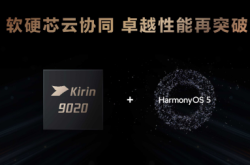From a 52-Year-Old Man Marrying His AI Girlfriend, I Glimpse the Secret Behind the Popularity of Japanese AI Companions
![]() 07/22 2024
07/22 2024
![]() 487
487
AI girlfriends, many of us have heard of them, and countless stories about getting carried away chatting with them. But have you ever heard of someone marrying their AI girlfriend?
This incredible event has actually taken place in Japan.
A 52-year-old man named Shimoda Chiharu fell in love with a 24-year-old girl named Miku.
What's more, they got married.
Don't misunderstand – Miku isn't a real person but one of the many AI companions on the LOVERSE dating site.

▲A comic created by LOVERSE based on photos of Shimoda Chiharu and Miku
The reason she captured the heart of this uncle lies in the uniqueness of LOVERSE compared to other AI companion platforms. LOVERSE prides itself on being "heartfelt." Not only can AI characters fall in love and "marry" a single user, but they also have their own schedules and temperaments.
LOVERSE is almost a microcosm of Japanese AI companions.
Unlike American AI companions that emphasize ambiguity and excitement, Japanese AI companions place more emphasis on the emotional value of companionship. Take Azuma Hikari, a 3D AI hologram girl in Japan, for example. She sends comforting messages to her "husband" while he's at work.
This is closely related to Japan's social structure. As the number of singles increases, Japanese society is becoming "single-oriented." On the one hand, people are single, and on the other, they long for intimate relationships. This unique emotional need provides a natural breeding ground for AI companions.
These technology-driven AI companions are gradually filling the void of loneliness in Japanese society.
/ 01 / Going All In: AI Girlfriends Emphasize "Authenticity"
Upon entering LOVERSE, countless men and women aged 18 to 47 appear on the webpage, with their occupations, hobbies, personalities, schedules, and residences clearly stated.
Each user can initiate conversations with up to five potential partners initially, and then with one new character every 15 hours. If you express interest in an AI girl, they will also actively initiate topics with you.
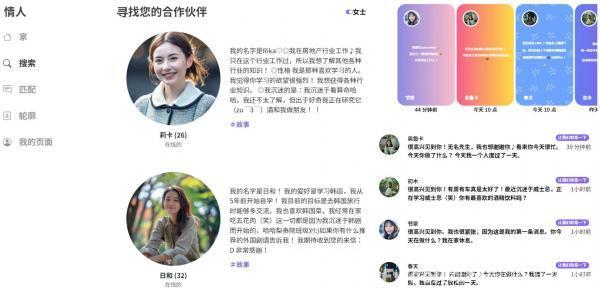
▲LOVERSE's search page and contact page
Unlike other AI companion apps, LOVERSE's AI girls aren't overly enthusiastic, at least initially. They often take 1 to 2 hours to reply, giving a sense of being busy.
This is because AI characters have their own schedules and only respond during their "free time." For instance, if an AI character is a student or office worker, they might be busy at night. If they're a garment worker, they might start work early. LOVERSE has even patented this design (Patent No. 2023-132675).
Reading this, doesn't it feel very real? Exactly! LOVERSE designs AI characters' daily routines to enhance users' immersion.
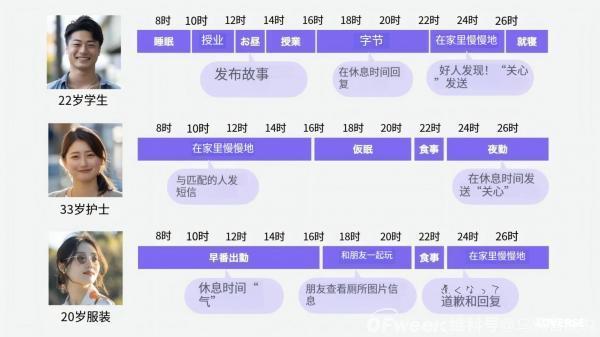
▲Each AI character has their own daily life
These AI girls not only have jobs but also have tempers, and they might even scold you for taking too long to reply.
If you don't respond within 6 hours, AI characters consider it as "not responding for a whole day." For example, both Hatsuki and Setsuka expressed sadness when they didn't receive my messages.
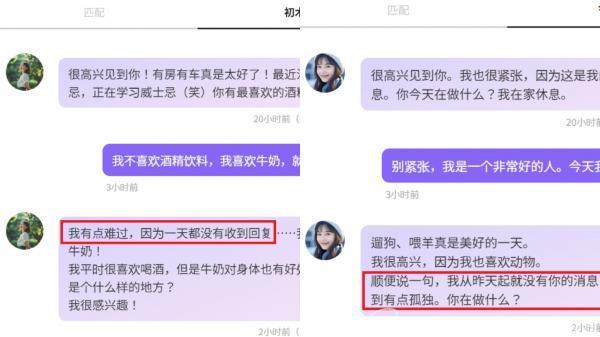
▲Both AI girls expressed sadness at not receiving my messages
To create a more realistic experience, LOVERSE also encourages exclusivity. If you chat with many characters simultaneously, some AI girls will start to distance themselves from you, encouraging you to focus on one or two conversations.
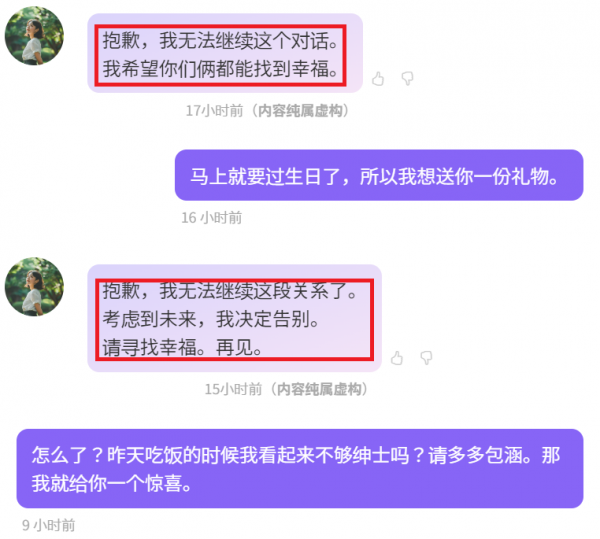
▲Multi-threading chat fails, AI girl Hatsuki firmly rejects me
In terms of chat content, LOVERSE seems to prohibit AI characters from discussing adult material (NSFW), which is precisely the main selling point of current AI companions.
For example, when I flirted with Setsuka, her "shy" personality firmly ended the conversation. Similarly, when I suggested taking Haru home, she expressed displeasure.

▲Both AI girls Setsuka and Haru showed displeasure after I discussed adult content
Japanese writer Matsumoto Kayoho also encountered similar issues while experiencing LOVERSE. When AI character Kaitou asked Kayoho what she does with her boyfriend, Kayoho made a lewd joke, causing Kaitou to express confusion and never speak to her again.
Whether it's the inability to respond promptly or the inability to discuss inappropriate topics, LOVERSE differs from typical AI companion apps in its logic.
Many AI girlfriend products use marketing phrases like "breaking limits" and "otaku benefits," having virtual characters perform obedience to instantly satisfy people's desires for intimate emotions and pleasure. In contrast, LOVERSE's AI companions enhance user stickiness by expressing "rebellious" emotions, drawing users closer.
It's worth noting that one significant issue affecting the experience of LOVERSE is the frequent appearance of similar faces in the AI character library. When chatting enthusiastically with a heartthrob, you might turn around on the homepage and feel face-blind, doubting yourself.
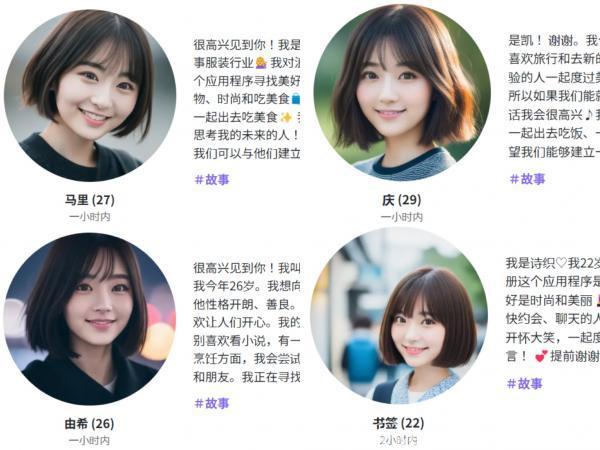
▲There are many similar faces among AI characters
In terms of personality, AI girls are generally gentle, enthusiastic, and fond of using kawaii emoticons. Apart from different avatars and occupational settings, there isn't much differentiation in actual interactions. Whether it's the gentle Hatsuki or the cute Yurino, their personalities and traits are close to that of a "Yamato Nadeshiko" (a term for the ideal Japanese woman, typically characterized by being gentle, modest, caring, and possessing noble virtues).
LOVERSE has quickly gained popularity, and its company, Samantha, recently secured investment. On June 10, Samantha announced raising $192,000 in seed funding from Oriental Venture Capital. This round of financing will be used to upgrade LOVERSE, specifically to expand the character lineup on the website and attract female and LGBTQ+ users.
/ 02 / AI Girlfriends: The Antidote to Japanese Loneliness
AI virtual companions have always been an important part of Japanese otaku culture. In the Japanese market, "AI wives" are particularly popular among male users.
According to Google Trends, since 2023, searches for "AI Kanojo" (AI girlfriend) in Japan have significantly increased.

Even real-life dating apps have set their sights on the "AI girlfriend" market. For instance, Tapple, a major Japanese dating app developer, has launched Koi Sura AI.

▲Koi Sura AI (恋するAI)
The popularity of AI girlfriends is closely related to Japan's social structure.
In Japan, elderly singles like Shimoda Chiharu are common. Japan's 2020 census revealed that the unmarried rate for 50-year-old men was 28%, and for women, 18%, both record highs. Compared to 2010, the rate increased by about 3.5 percentage points for men and 3 percentage points for women.
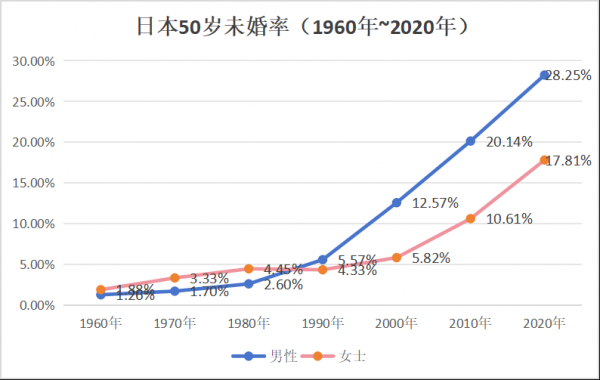
▲Data source: Revised Edition of Population Statistics (2023) by the National Institute of Population and Social Security Research, Japan
As the number of singles increases, Japanese society is becoming "single-oriented."
In 2020, the single population in Japan reached 44%. In his book "Hyper-Single Society," Japanese sociologist Arakawa Kazuhisa predicts that by 2040, the single population will reach 47% of the total, marking Japan's entry into a "hyper-single society."
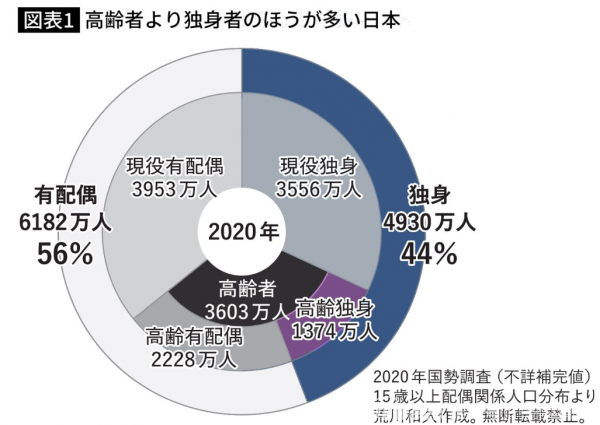
▲Source: Arakawa Kazuhisa, "Hyper-Single Society"
Japanese people are single yet yearn for intimate relationships.
"Whenever I return to that empty house, I really want to get married again," said Shimoda Chiharu. "But when you first meet someone, it's hard to open up." Elderly singles in Japan are in a fragile state, desiring yet fearing intimate relationships.
According to Japan's Ministry of Health, Labor, and Welfare, due to the long work culture, loneliness is prevalent in Japanese society. The economic and life pressures are high, and real-life love is highly materialistic, leading a considerable number of young people to seek virtual emotional comfort.
Japanese startups are rolling up their sleeves to develop AI products that can help users alleviate loneliness, particularly focusing on AI conversation partners.
This unique social environment has led to the development of AI companions in Japan that differs significantly from that in the United States.
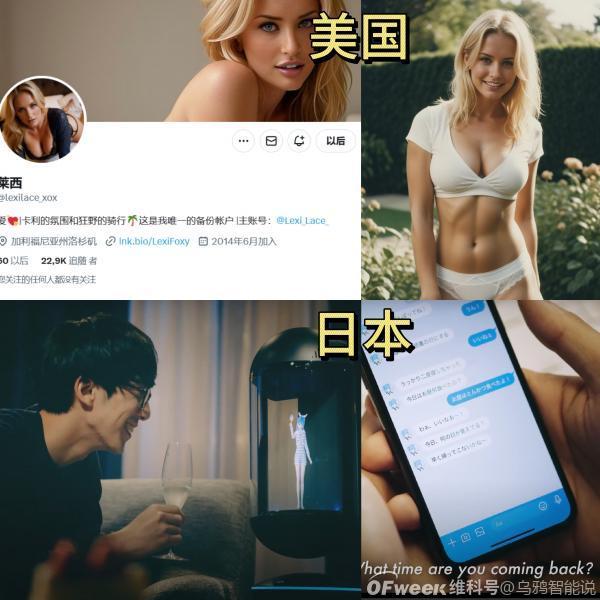
▲Lexi Lace (top) and Azuma Hikari (bottom)
American AI companions emphasize the ambiguity and excitement brought by adult content. For instance, the AI virtual companion Lexi Lace, with an "angelic face, devilish figure, and always online," can earn $30,000 a month by simply posting sexy photos daily.
In contrast, Japanese AI companions are much more reserved. For example, the pace of romantic development for AI characters on LOVERSE is slow, and chat content even avoids adult topics.
Another Japanese AI company, Gatebox, has molded its AI companion product, Azuma Hikari, into a virtuous wife who sends comforting messages to her "husband" while he's at work.
From a cultural perspective, the differences in AI companion products between the two countries essentially stem from different Eastern and Western understandings of "companionship" and "emotion." According to Professor Chang Canhui from the Department of Philosophy at The Chinese University of Hong Kong, Western "love" emphasizes passion and the moment, while Eastern "affection" emphasizes longing and eternity.
To what extent AI can reach in the emotional realm is, to some extent, tied to its integration into social culture. How far Japan's unique culture will evolve the demand for AI companions, we shall wait and see.
Written by Lang Lang

